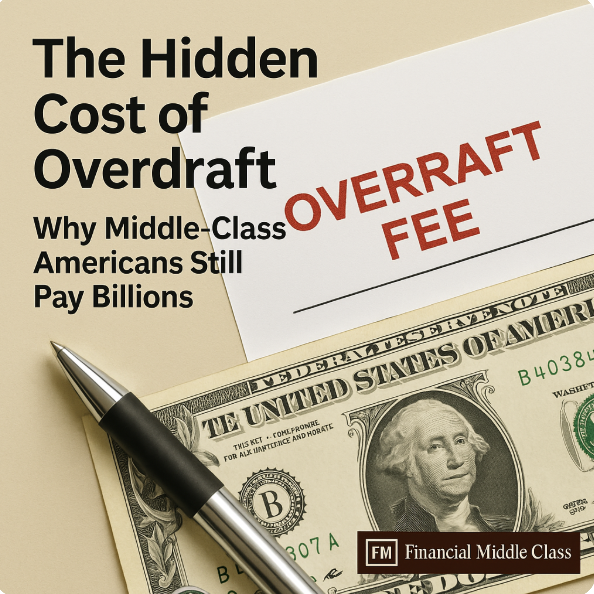Introduction: The Bank’s $35 Coffee
You buy a $3 coffee on your debit card, but your account is a little short. Instead of declining the transaction, your bank covers it—and charges you $35. Suddenly, that latte isn’t a small indulgence. It’s an expensive lesson. Multiply that across millions of Americans, and you see why banks still collect billions every year in overdraft and NSF (non-sufficient funds) fees.
For middle-class Americans—already squeezed by rising living costs—these fees are more than a nuisance. They’re a hidden tax on financial vulnerability.
What Exactly Is an Overdraft Fee?
An overdraft fee happens when your bank lets a transaction go through even though you don’t have enough money in your account. Instead of rejecting the purchase, they “spot” you the money, but charge a hefty fee for the service.
- Typical cost: $30–$35 per overdraft
- NSF fee: Charged if your bank simply rejects the payment instead of covering it
- Multiple hits: A single day of small purchases can trigger several fees
Think of it as a penalty for bad timing—your money didn’t arrive before your spending did.
Why Overdraft Still Matters in 2025
Many banks announced they were “cutting back” overdraft fees. Some eliminated them altogether. But here’s the reality:
- Banks still made billions. In 2022 alone, overdraft and NSF fees raked in more than $7.7 billion.
- Rules vary widely. Some banks rebranded fees as “extended overdraft” or “courtesy pay.”
- The middle class is most exposed. Living paycheck to paycheck means even one mistimed bill payment can cost you $35.
Overdraft is less about reckless spending and more about the fragility of everyday cash flow.
The Psychology of Overdraft
Banks design overdraft “protection” as if they’re doing you a favor. In reality, they’re counting on the psychology of embarrassment and urgency.
- People often accept overdraft programs automatically because they fear card declines.
- Many don’t realize they can opt out.
- Small amounts (like $5 overdrawn) can trigger the same $35 fee as a $200 shortfall.
It’s like paying a limo fare just because you missed the bus.
Action Steps: How to Stop Paying Overdraft Fees
- Set Up Low-Balance Alerts
Most banks allow text or app notifications when your account dips below a threshold. Treat these as stop signs, not suggestions.
- Link a Savings Account
Even a small emergency cushion can prevent fees. Transferring $25 from savings beats paying $35 to the bank.
- Use a No-Overdraft Bank
Credit unions and online banks like Ally, Capital One, and Chime have zero overdraft fee policies. Switching accounts is easier than you think.
- Rethink “Overdraft Protection”
This often means linking your debit card to a credit line—with interest rates worse than credit cards. Opt out unless you fully understand the cost.
- Budget Around Pay Cycles
If you get paid on the 15th and 30th, arrange bill due dates just after payday. Many creditors will adjust dates if you ask.
The Bigger Picture: Regulation and Reform
Regulators like the Consumer Financial Protection Bureau (CFPB) have pressured banks to scale back overdraft abuse. But the fight isn’t over:
- Some banks are transparent, others simply rename the fees.
- New fintech competitors are forcing change, but big banks still dominate.
- The middle class remains the group most dependent on mainstream banks.
Which means if you don’t take action, you’re effectively subsidizing a business model built on your vulnerability.
Related Reads:
Call to Action: Audit Your Bank Today
Look at your last 12 months of bank statements. Add up overdraft and NSF charges. Then ask yourself: is my bank a partner in my financial health, or a predator on my paycheck timing?
If the answer doesn’t feel right, it’s time to switch. There are better options—banks and credit unions that respect your money instead of taxing your mistakes.

Pingback: Zelle Scams: What to Know Before You Send - FMC
Pingback: Wells Fargo, Bank of America, and the History of Bank Scandals - FMC
Pingback: Financial Literacy in America: A National Crisis - FMC